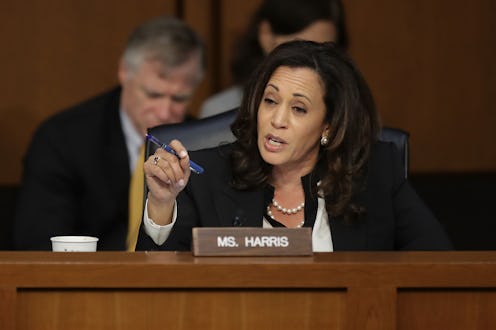News
The Complicated Sexism Of A Male Politician Interrupting Kamala Harris

A large corner of Twitter was up in arms Wednesday after California Sen. Kamala Harris was overtly interrupted during a Senate intelligence hearing. Many critics are calling out her recent heated exchanges with male politicians as yet another sign of sexism in the world of politics. However, the alleged bias may not be so simple.
While I could easily argue that silencing Harris was a symptom of general misogyny, I'd prefer to focus on the specifics of the often invisible sexism of how male politicians speak. But first, let's contextualize the moment itself.
The interruption took place when Harris pressed Deputy Attorney General Rod Rosenstein on whether he'd write a letter granting Special Counsel Robert Mueller complete independence from the Justice Department during his probe into election interference involving the possible collusion between Trump's associates and Russia.
A report from USA Today noted that when faced with Harris' question, Rosenstein neglected to directly answer yes or no. Instead, he began, "Senator, I'm very sensitive about time, and I'd like to have a very lengthy conversation and explain that all to you."
Harris then cut Rosenstein off, requesting clarity, when she asked, "Can you give me a 'yes or no' answer?"
"It's not a short answer, senator," Rosenstein continued, to which Harris responded: "It is. Either you are willing to do that or you are not."
It was during the heat of this exchange that Harris was cut off by the Republican committee chairman Richard Burr, who instructed her to act with courtesy.
"Will the senator suspend?" Burr admonished. "The chair is going to exercise its right to allow the witnesses to answer the question, and the committee is on notice to provide the witnesses the courtesy, which has not been extended all the way across, extend the courtesy for questions to get answered."
Understandably, many people interpreted the suspension from Burr as a sexist attempt to silence Harris, one of only three women present at the hearing.
The online detractors of the silencing included the firebrand Massachusetts Sen. Elizabeth Warren, who tweeted her support for Harris, saying, "Silencing @SenKamalaHarris for not being “courteous” enough is just unbelievable. Keep fighting, Kamala! #NeverthelessShePersisted"
At a basic level, I would agree that suspending Harris' comments felt gendered, particularly, considering the fact that her male colleagues weren't interrupted in the same way.
Following the hearing, Oregon Deocratic Sen. Ron Wyden noted that Burr never interrupted him, even while asking probing questions. He tweeted that Harris "was getting facts onto the record" and added "I was not interrupted by @senatorburr when I asked tough questions. She was."
From my perspective, this specific moment of silencing was a direct symptom of a culture that has routinely excluded women from the political arena for decades. I believe that excluding women from politics has made men used to only being surrounded by other men, and, therefore, blind to their biases.
Moreover, since the Senate is male-dominated, it's no spectacle when a man rambles, interrupts, or asks probing questions. But the "otherness" of women makes it more noticeable obvious when female politicians are grilling a colleague.
This systemic pattern of silencing female politicians was made overtly clear when Donald Trump interrupted Hillary Clinton 51 times during the first presidential debate — and she interrupted him a third of that, 17 times.
My personal interest in this pattern of gendered silencing isn't the question of whether or not it's sexist — though it is worth noting that, yes, I think it's a symptom of sexism, but, no, unlike other forms of sexism I don't believe it's fully cognizant or intentional. Rather, for me, the most frustrating part of this speaking dynamic is the embedded nature. Many male politicians don't critique the tones and arguments of other men with the same fervor as their female counterparts, not because they don't disagree or wish to interrupt, but because they're so used to men speaking freely.
Hopefully, as more and more women run for office and enter the political arena, this pattern will die off. Or at least, the women will speak even louder.